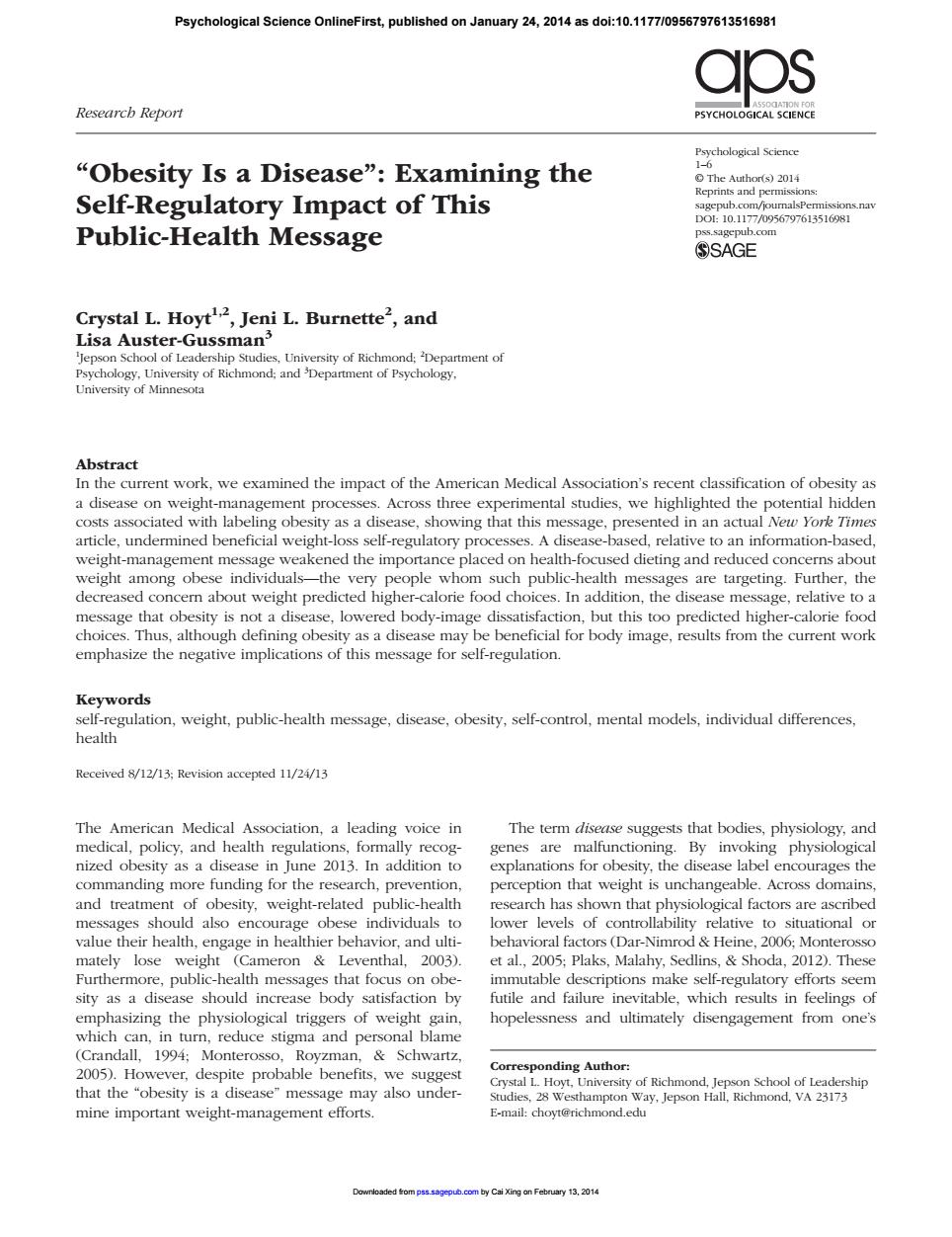正在加载图片...

Psychological Sclence OnlineFirst,published on January 24,2014 as doi:10.1177/0956797613516981 aos Research Report PSYCHOLOGICAL SCIENCE “Obesity Is a Disease'”:Examining the Self-Regulatory Impact of This Public-Health Message SAGE In the current work.we examined the impact of the American Medical Association's recent classification of obesity as a disease on weight-management processes.Across three experimental studies,we highlighted the potential hidden costs associated with labeling obesity as a disease.showing that this message,presented in an weight among obese individuals the very people whom such public-health messages are targeting.Further.the decreased concem about weight predicted higher-calorie food choices.In addition,the disease message,relative toa message that ob sage f-regulatio Keywords Received 8/12/3 Revision accepted 11/24/13 The American Medical Association,a leading voice in The term disease suggests that bodies,physiology,and health 2 genes ar and treatment of obesity.weight-related public-health ach has shown that p hysiological factors are ascribed messages should also encourage obese individuals to lower levels of controllability relative to situational or rs (Dar- DCg et sit disas should increase bod satisfaction by futile and failure inevitable.which results in feelings of hopelessness and ultimately disengagement from one's which can,in tum. 20051.H0 1994d that the obesity is a disease"message may under mine important weight-management efforts. ,20Psychological Science 1–6 © The Author(s) 2014 Reprints and permissions: sagepub.com/journalsPermissions.nav DOI: 10.1177/0956797613516981 pss.sagepub.com Research Report The American Medical Association, a leading voice in medical, policy, and health regulations, formally recognized obesity as a disease in June 2013. In addition to commanding more funding for the research, prevention, and treatment of obesity, weight-related public-health messages should also encourage obese individuals to value their health, engage in healthier behavior, and ultimately lose weight (Cameron & Leventhal, 2003). Furthermore, public-health messages that focus on obesity as a disease should increase body satisfaction by emphasizing the physiological triggers of weight gain, which can, in turn, reduce stigma and personal blame (Crandall, 1994; Monterosso, Royzman, & Schwartz, 2005). However, despite probable benefits, we suggest that the “obesity is a disease” message may also undermine important weight-management efforts. The term disease suggests that bodies, physiology, and genes are malfunctioning. By invoking physiological explanations for obesity, the disease label encourages the perception that weight is unchangeable. Across domains, research has shown that physiological factors are ascribed lower levels of controllability relative to situational or behavioral factors (Dar-Nimrod & Heine, 2006; Monterosso et al., 2005; Plaks, Malahy, Sedlins, & Shoda, 2012). These immutable descriptions make self-regulatory efforts seem futile and failure inevitable, which results in feelings of hopelessness and ultimately disengagement from one’s 516981PSSXXX10.1177/0956797613516981Hoyt et al.“Obesity Is a Disease” research-article2014 Corresponding Author: Crystal L. Hoyt, University of Richmond, Jepson School of Leadership Studies, 28 Westhampton Way, Jepson Hall, Richmond, VA 23173 E-mail: choyt@richmond.edu “Obesity Is a Disease”: Examining the Self-Regulatory Impact of This Public-Health Message Crystal L. Hoyt1,2, Jeni L. Burnette2 , and Lisa Auster-Gussman3 1 Jepson School of Leadership Studies, University of Richmond; 2 Department of Psychology, University of Richmond; and 3 Department of Psychology, University of Minnesota Abstract In the current work, we examined the impact of the American Medical Association’s recent classification of obesity as a disease on weight-management processes. Across three experimental studies, we highlighted the potential hidden costs associated with labeling obesity as a disease, showing that this message, presented in an actual New York Times article, undermined beneficial weight-loss self-regulatory processes. A disease-based, relative to an information-based, weight-management message weakened the importance placed on health-focused dieting and reduced concerns about weight among obese individuals—the very people whom such public-health messages are targeting. Further, the decreased concern about weight predicted higher-calorie food choices. In addition, the disease message, relative to a message that obesity is not a disease, lowered body-image dissatisfaction, but this too predicted higher-calorie food choices. Thus, although defining obesity as a disease may be beneficial for body image, results from the current work emphasize the negative implications of this message for self-regulation. Keywords self-regulation, weight, public-health message, disease, obesity, self-control, mental models, individual differences, health Received 8/12/13; Revision accepted 11/24/13 Psychological Science OnlineFirst, published on January 24, 2014 as doi:10.1177/0956797613516981 Downloaded from pss.sagepub.com by Cai Xing on February 13, 2014